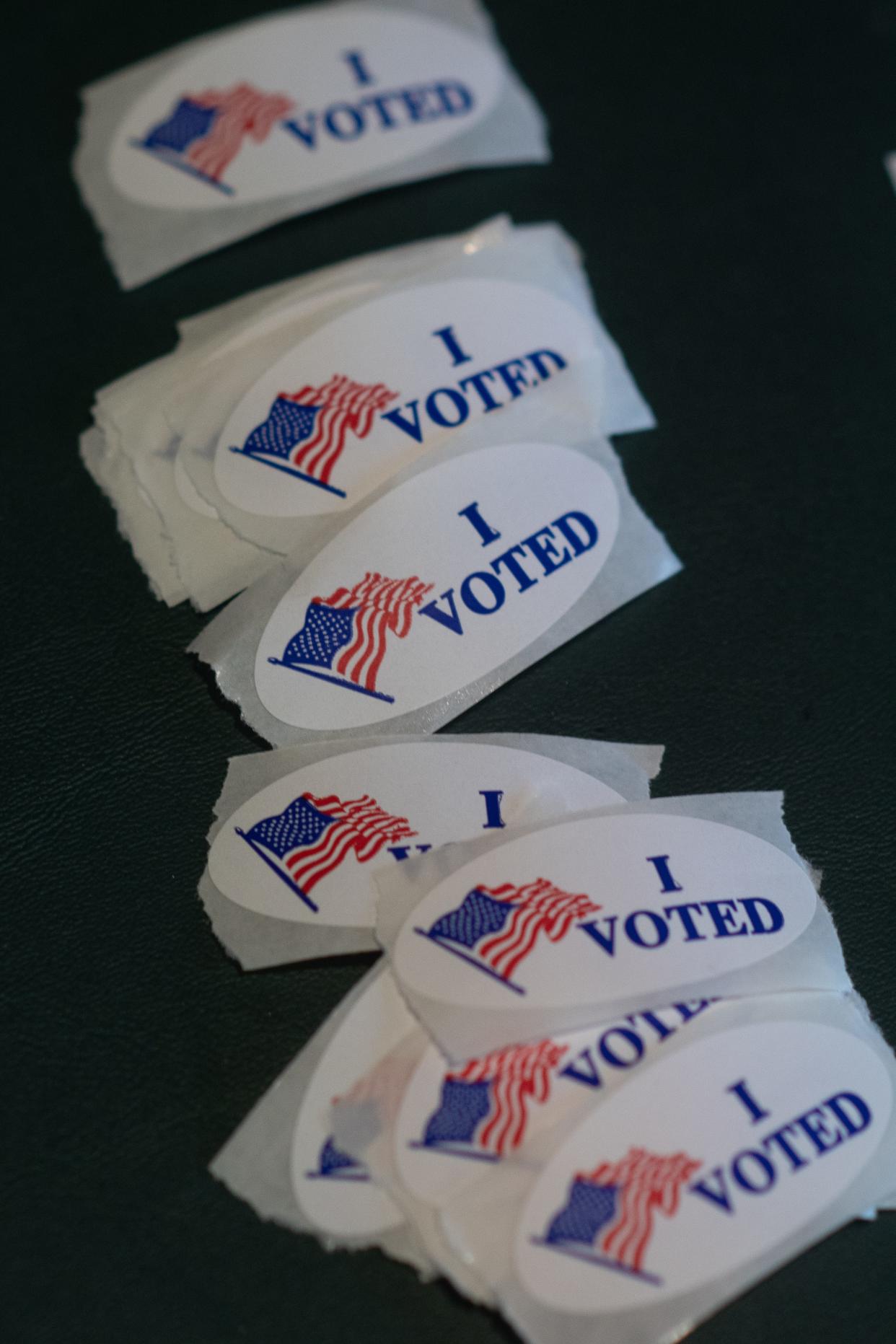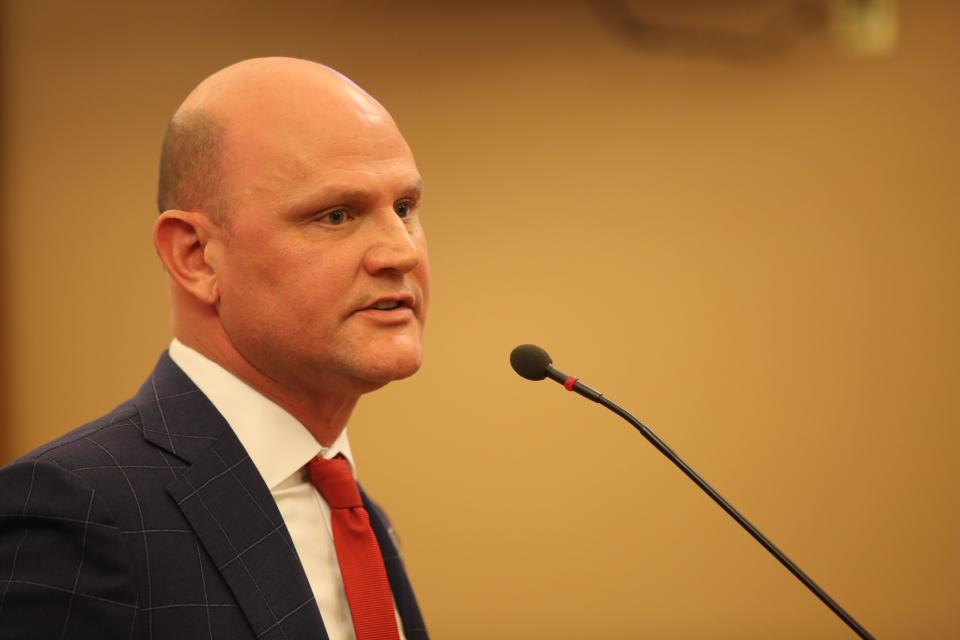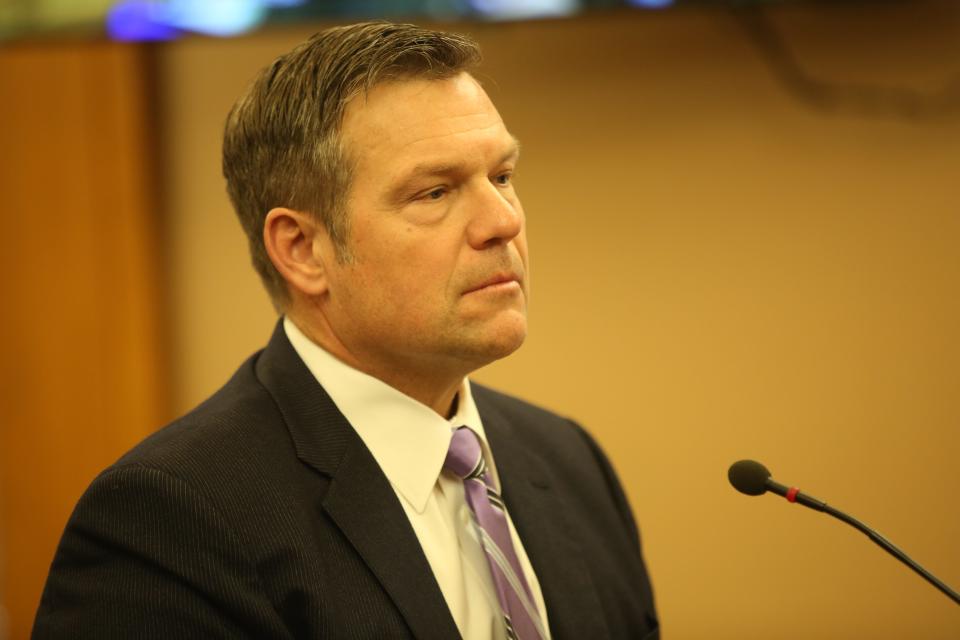Kansas lawmakers advance bills to restrict ballot drop boxes, mail voting amid GOP split

- Oops!Something went wrong.Please try again later.
Kansas lawmakers approved a slate of bills Thursday that would ban the use of ballot drop boxes across the state and restrict mail voting, despite a split among Republicans over the merits of those moves.
The bills both passed shy of the two-thirds threshold needed to overcome a veto from Gov. Laura Kelly.
The debate creates the rare scenario where two prominent Republican officials — Secretary of State Scott Schwab and Attorney General Kris Kobach — are at odds over the ballot drop box restrictions, with Schwab and numerous Republican legislators raising concerns about its impact, particularly on rural voters.
Most officials agree that the 2022 elections in Kansas went off without a hitch.
But baseless conspiracy theories regarding elections have only increased in the state, with elected officials and activists alike arguing that the state's election security protocols are overly lax and that the perception must be corrected.
"There is nothing more fundamental to our system of government than confidence from the voters that the results of the election reflect the will of the people," said Rep. Pat Proctor, R-Leavenworth, chair of the House Elections Committee. "And anything we can do to improve that confidence is a public good, a policy good and something we should do."
Schwab, for instance, was challenged by a conservative Republican, Mike Brown, who argued the state was not doing enough to deter fraud. Brown is now chair of the Kansas Republican Party — a sign that the debate over voting in Kansas will be even more prominent, not less.
"We have a perfect system in place now," said House Minority Leader Vic Miller, D-Topeka. "This idea that people have lost confidence in elections is because we have a bunch of loonies running around pretending we have fraud without a single bit of evidence to support that case. But yes, if you repeat an incorrect statement often enough, eventually people will believe it."
Ballot drop box changes split Scott Schwab and Kris Kobach

Initially, Senate Bill 208 would have only limited the use of the drop boxes to one per county.
But lawmakers voted to amend the bill to ban them outright at the behest of Sen. Caryn Tyson, R-Parker, who argued they "allow for the possibility of foul play,"
"I want to know that every vote counts and that every vote is worth its weight, that there are not artificial votes being put in," Tyson said.
In the 2022 election, 85 counties used ballot drop boxes, with some, such as Sedgwick and Johnson counties, using over a half-dozen.
Schwab has long argued in favor of drop boxes, arguing that security concerns raised by their critics are unfounded and that they are more reliable than the U.S. Postal Service.
His office has instead favored a bill, advanced by the House Elections Committee earlier this month, that would give Schwab's office the ability to set rules after consulting with local election officials.
"Why on God's green earth would you want the U.S. Postal Service in charge of your ballot?" Schwab said.

But Kobach, who campaigned on the elimination of drop boxes last year, argued that the practice makes it effectively impossible to enforce the state's prohibition on any one person returning more than 10 advance ballots.
He pointed to a prominent case of ballot harvesting in North Carolina carried out by Republican officials and argued the practice occurs with "significant regularity," though there is no evidence of widespread fraud in Kansas.
"To add this one additional measure, which makes our crime of ballot harvesting unenforceable, I would say fails the cost benefit analysis," Kobach said.
The debate has turned contentious. Sen. Oletha Faust-Goudeau, D-Wichita, said she has had all four of her car doors kicked in as a result of her opposition to such legislation as the drop box ban.
She noted that her mother and aunts fought for the right to vote, and she wants to continue fighting to make it easier to vote.
"I received threats recently, racial threats have come to me recently on Facebook, my home … my emails, my cell phone," Faust-Goudeau said. "I haven't even used my phone all day because I didn't want to see any more messages."
Lawmakers approved the bill on a 21-19 vote, with seven Republicans opposing the measure to leave lawmakers shy of the two-thirds supermajority needed to override a veto from Gov. Laura Kelly.
Kansas lawmakers opt to narrow mail voting window amid criticism
Lawmakers in the House and Senate also approved legislation that would abbreviate the window of time for advance mail ballots to reach the county elections office.
Currently, mail ballots will be counted if they are received by local election officials by 5 p.m. on the Friday following the election, provided it is postmarked by Election Day. House Bill 2056 and Senate Bill 209 would end the so-called "three-day grace period" and require ballots be returned by 7 p.m. on Election Day.
Proponents have argued the measure is needed to increase confidence in mail voting, arguing that residents are confused and dismayed by results potentially be swayed by late-arriving mail ballots.
Sen. Mike Thompson, R-Shawnee, compared it to giving the losing team in the Super Bowl extra time to attempt to score, even if they were losing after four quarters. Those who had difficulty getting their mail ballot in time had other options, he added.
"They can vote on something called Election Day — voting is a privilege," he said. "If it was an inalienable right, we would hand out ballots to newborn babies and felons. You have a duty if you want to vote to get your ballot in on time. The Post Office cannot be a consideration. We cannot write legislation that compensates for their ability or inability to get your ballot in on time."
When asked if he was aware of any voter fraud, however, Thompson said he would need to confer with Kobach or Schwab, who has maintained the state is free of widespread problems, but added that "just because I am not aware does not mean it did not happen."
Sen. John Doll, R-Garden City, said the bill was a "backslap" to rural voters and was "just crazy."
"In this world today, it seems to be that if we had election fraud it would be all over the newspaper," Doll said.
But results reported by state and local election officials are unofficial and could still change as counties adjudicate provisional ballots at the county canvass.
Voting rights advocates, meanwhile, argue that eliminating the three-day grace period will increase the number of ballots tossed out for certain classes of voters who rely on mail voting, such as individuals with disabilities and voters who work on Election Day.
The U.S. Postal Service has become increasingly unreliable in recent years, critics of the bill argue. In Kansas, mail must frequently be routed to New Mexico, Colorado or Missouri to be processed before returning to the state, even if it is being delivered 10 miles down the road.
Kansas bill would allow partisan labels in local and school board elections
Lawmakers rejected, however, a bill that critics say would effectively end nonpartisan local elections in the state, after 13 Republicans joined all Democrats in opposition.
Senate Bill 210 would have allowed candidates for city, county or school board positions to list their political affiliation on the ballot and would nix local regulations on the matter.
Supporters argue it is a voluntary way of giving voters more information about the local candidates on their ballot.
"A candidate who decides to provide their party affiliation to their own name has merely made the decision to provide more information to city and school board voters," said Eric Rucker, chief-of-staff for Senate Majority Leader Larry Alley, who helped draft the bill. "This is a step in the right direction. It is an act of transparency that gives voters more information on which to base their decisions."
But local governments oppose what they see as a loss of local control. And there are concerns that individuals who are enlisted in the military or employed by the federal government would be limited in running for local positions, as they are barred from seeking partisan office.
"I think it potentially would have a freezing effect if an individual thought it would affect their employment," John Goodyear, a lobbyist with the Kansas League of Municipalities, told lawmakers. "I think they would just choose not to run for that office, rather than going and litigating it."
Sen. David Haley, D-Kansas City, noted that when lawmakers moved local elections from the fall to the spring, a compromise was reached to ensure they were nonpartisan races.
"The issue is not muddied by team-sporting of partisan affiliation, if you will," he said.
This article originally appeared on Topeka Capital-Journal: Drop boxes, mail voting under fire in Kansas bills amid fraud concerns

